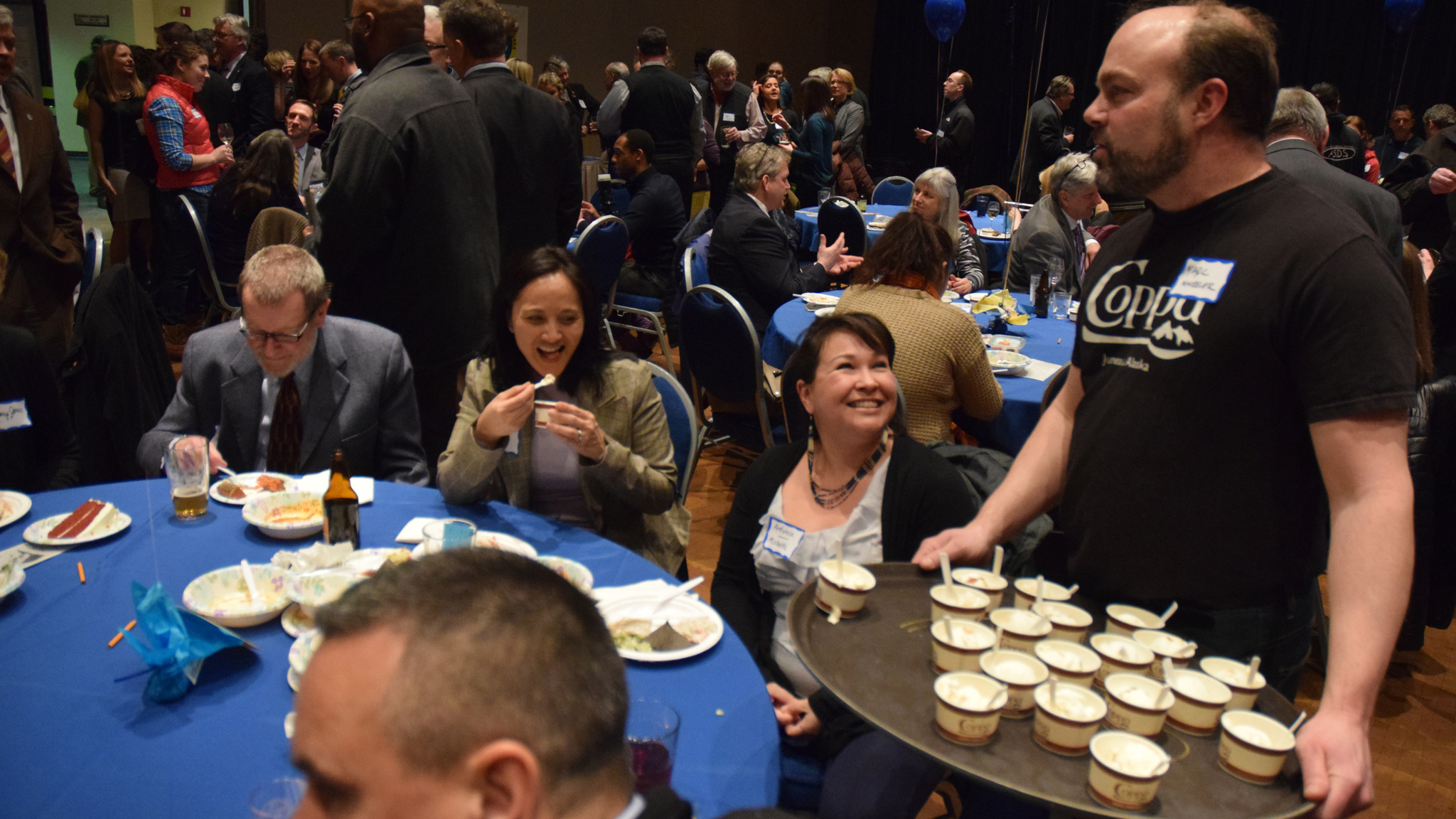In any supermarket, you’ll find dozens of pork, beef and chicken products. Not so for salmon.
When it comes to sockeye, king or coho, U.S. consumers are largely limited to raw product and pre-cooked, breaded fish sticks.
That’s a problem for the seafood industry, said Alaska Fisheries Development Foundation Julie Decker, co-host of Wednesday’s Symphony of Seafood new product competition at Centennial Hall. If Alaska wants to increase the value of its seafood industry, Decker said, it will have to take chances on locally-produced, shelf-ready goods like the kelp salsa, baby food and salmon leather wallets on display at the symphony.
The AFDF has been putting on the symphony for 24 years now in an attempt to diversify the industry. Product development is key to helping the industry adapt to international competition.
Product development was super important in the early 2000s, Decker said, when farmed fish began to take a large market share from Alaskan fresh seafood. Consumers couldn’t tell the difference and the inability to differentiate our seafood hit the industry hard.
“In general, the Alaska salmon industry was sort of business as usual, business as usual, no reason to invest or change if we’re doing OK. Well, then farmed fish came on the market with fresh fillets that looked pretty good to the average U.S. consumer who doesn’t commercial fish,” Decker said.
“It forced us to sort of start doing better quality, start doing new products. When you do that, you get entrance into new markets, which is really important.”
The Symphony of Seafood featured 18 new products competing in four different categories. The competition aims to highlight “value-added” products, the new and unusual ideas that require a bit more processing than your typical fillet or fish stick.
The grand prize winner, Coppa cafe and artisan ice cream shop, won a trip to the Boston Seafood Show in March for their candied salmon ice cream.
Bambino’s Baby Food’s frozen salmon bisque was one of the more unusual ideas at the competition. Owner and creator Zoi Maroudo won the foodservice category at last year’s symphony with her halibut bisque baby food.
She’s now selling a sockeye bisque in the same form as her halibut product — star-shaped frozen bites she sells direct to consumers. Adding value to Alaska’s seafood industry is “exactly” Bambino’s mission, Maroudo said, as well as supporting Alaska grown produce.
“Value-added is one of my key things,” she said. “You already know that Alaska seafood is above level, but the agriculture is very pure compared to the Lower 48.”
For Orca Bay Food’s Lilani Estacio, visiting from company headquarters in Renton, Washington, the name of the game is softening the intimidation factor of raw seafood products. U.S. consumers, Estacio said, are intimidated by cooking seafood themselves.
To appease those tastes, Orca Bay has been pursuing value-added products since it opened 30 years ago. They took home three awards for their jjampong and albondigas soups, a couple of trendy Korean and Mexican dishes with a seafood twist.
“Consumers are constantly giving feedback and trying to get more comfortable with seafood,” Estacio said. “They’re always asking about temperatures, cook times. It’s just really obvious that people just aren’t comfortable cooking seafood in their own kitchen.”
Local Matt Kern has been cooking kelp salsa for himself for years. Always popular with his friends, his supply ran out after every potluck, so last year he decided to commercialize as AK Kelp Co.
He sold out at last year’s Juneau Public Market.
“We grind the kelp down and use it as a base for the salsa. It keeps a little bit of a crisp texture and keeps a base savory flavor,” Kern said.
For him, value adding is more than just good business.
“We want to keep everything in-house, which is a little more risky,” Kern said. “If we’re using a local resource like kelp, we think that that economic benefit should stay as localized as possible.”
• Contact reporter Kevin Gullufsen at 523-2228 or kevin.gullufsen@juneauempire.com.

